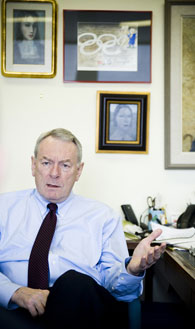The renaissance man of true crime
The renaissance man of true crime McGill University
User Tools (skip):
The renaissance man of true crime
Richard Pound chronicles tragic miscarriage of justice
Win Wimbledon. Swim the English Channel. Walk in space. These three items could very well be on Richard Pound's ever-dwindling To Do list. Chancellor of McGill, Chairman of the World Anti-doping Agency, partner in the Montreal law firm of Stikeman Elliott and a former Olympic swimmer, the outrageously accomplished Pound will conquer a new frontier on September 17 with the release of his book Unlucky to the End; The Story of Janise Marie Gamble (McGill-Queen's University Press).

Chancellor Richard Pound gives straight talk on all things literary.
Claudio Calligaris
Not that this is his first foray into the world of literature. By his own count, Pound has authored "seven or eight" books, including a biography of W.R. Jackett, the first Chief Justice of the Federal Court of Canada. It's the genre of Unlucky to the End that makes it stand out. Richard Pound, true crime author?
In Unlucky to the End, Pound tells the shocking story of Janise Marie Gamble, a 21-year-old Peterborough woman who, on March 12, 1976, was sentenced to 25 years to life in prison for the first-degree murder of Calgary police officer Allan Keith Harrison during a botched robbery—despite the irrefutable evidence that she had not fired the fatal shot.
Pound first heard of the story from his squash partner and fellow McGill alumni, Colin Irving—a Montreal lawyer who took up Gamble's cause after seeing her story on CBC's the fifth estate and eventually helped secure her release after 14 years. "Irving asked me if I was interested in writing the book and gave me all his files," says Pound.
Poring over the documents, Pound's interest turned to shock and incredulity at the court proceedings. In the book, Pound contends that the sentence was based on legislation not even in force at the time. As a result, Gamble was punished more severely than she would have been under the existing law of the day. "When you realize that she was charged with a crime that didn't exist at the time that the events took place and given a sentence that didn't exist at the time that the events took place—something is clearly wrong," he says.
Pound broadened his research by conducting interviews with witnesses, police and lawyers from both camps. The deeper he probed, the more disturbed he became with his findings. "It's scary to see how very small incremental steps can lead to life in prison," he says.
Having completed the bulk of his research—or "most of the backswing" as he puts—Pound had to put the book on the shelf for several years as other literary projects demanded his attention, including a book on the Olympics that was published in 2004 and another on doping in sports that came out in 2005.
Although it only took four months to write when he finally sat down to do it, Pound shrugs off the suggestion that it was any great literary feat. "I think it's easier to write non-fiction than fiction. When you have to sit there and generate a story from your own head—I can see why that would be daunting. With non-fiction it's just a matter of marshalling the facts and telling the story the way it happened. Hopefully, the injustice or the pathos will hit you that much harder."
And where does Pound find the time to research and write such a thorough account—especially considering his many professional duties? "There's loads of time," he says in his typical straight-shooting manner. "The key is just not to piss it away." Spoken like a true crime writer.

